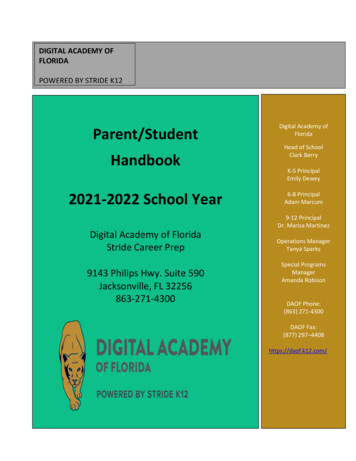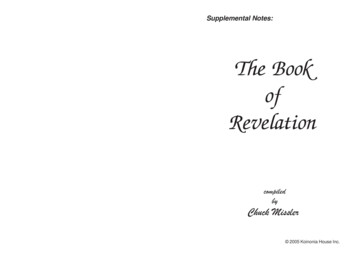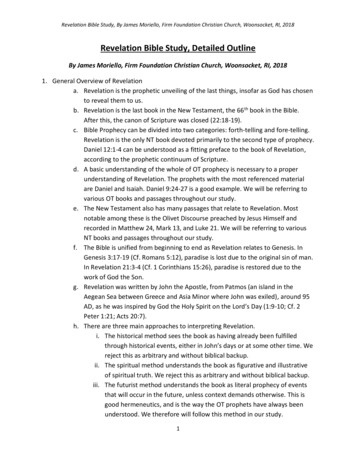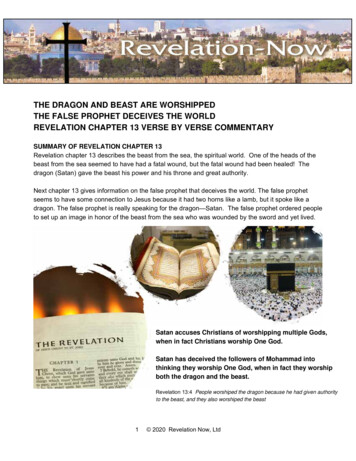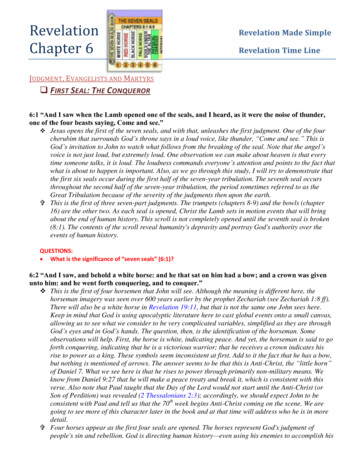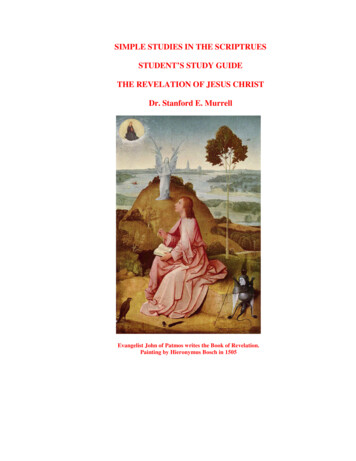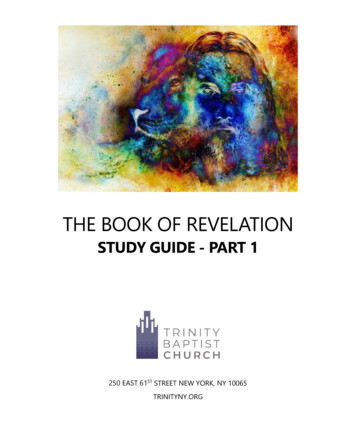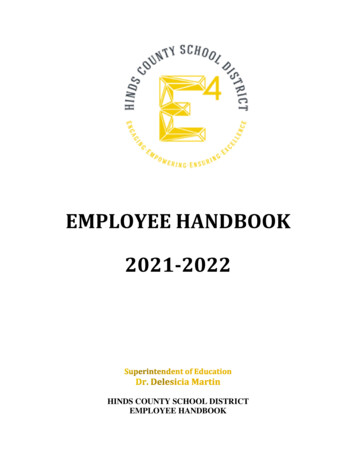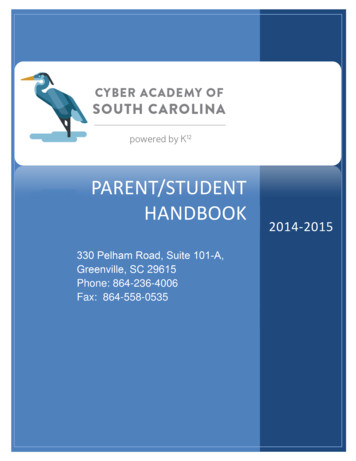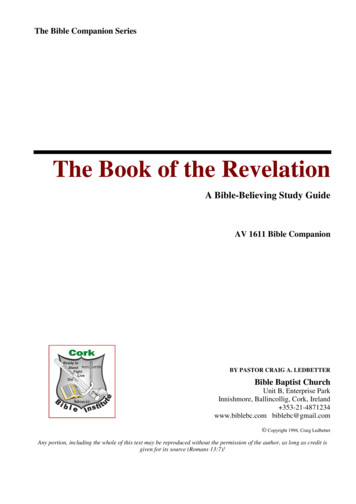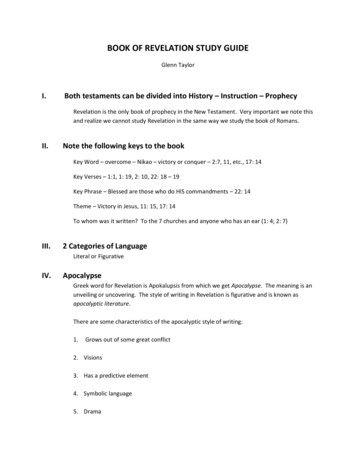
Transcription
PHILOSOPHY OF HUMAN EXPERIENCE 2004–05RevelationFrom, Everything That Rises Must ConvergeBy Flannery O’ConnorThe Doctor’s waiting room, which was very small, was almost full whenthe Turpins entered and Mrs. Turpin, who was very large, made it lookeven smaller by her presence. She stood looming at the head of themagazine table set in the center of it, a living demonstration that theroom was inadequate and ridiculous. Her little bright black eyes tookin all the patients as she sized up the seating situation. There was onevacant chair and a place on the sofa occupied by a blond child in adirty blue romper who should have been told to move over and makeroom for the lady. He was five or six, but Mrs. Turpin saw at once thatno one was going to tell him to move over. He was slumped down inthe seat, his arms idle at his sides and his eyes idle in his head; his noseran unchecked.Mrs. Turpin put a firm hand on Claud's shoulder and said in a voicethat included anyone who wanted to listen, "Claud, you sit in that chairthere," and gave him a push down into the vacant one. Claud was floridand bald and sturdy, somewhat shorter than Mrs. Turpin, but he satdown as if he were accustomed to doing what she told him to.Mrs. Turpin remained standing. The only man in the room besidesClaud was a lean stringy old fellow with a rusty hand spread out oneach knee, whose eyes were closed as if he were asleep or dead orpretending to be so as not to get up and offer her his seat. Her gaze1
PHILOSOPHY OF HUMAN EXPERIENCE 2004–05settled agreeably on a well-dressed grey-haired lady whose eyes methers and whose expression said: if that child belonged to me, he wouldhave some manners and move over-there's plenty of room there foryou and him too.Claud looked up with a sigh and made as if to rise."Sit down," Mrs. Turpin said. "You know you're not supposed to standon that leg. He has an ulcer on his leg," she explained.Claud lifted his foot onto the magazine table and rolled his trouser legup to reveal a purple swelling on a plump marble white calf."My!" the pleasant lady said. "How did you do that?""A cow kicked him," Mrs. Turpin said."Goodness!" said the lady.Claud rolled his trouser leg down."Maybe the little boy would move over," the lady suggested, but thechild did not stir."Somebody will be leaving in a minute," Mrs. Turpin said. She couldnot understand why a doctor-with as much money as they madecharging five dollars a day to just stick their head in the hospital doorand look at you-couldn't afford a decent-sized waiting room. This one2
PHILOSOPHY OF HUMAN EXPERIENCE 2004–05was hardly bigger than a garage. The table was cluttered with limplooking magazines and at one end of it there was a big green glassashtray full of cigarette butts and cotton wads with little blood spots onthem. If she had had anything to do with the running of the place, thatwould have been emptied every so often. There were no chairs againstthe wall at the head of the room. It had a rectangular-shaped panel in itthat permitted a view of the office where the nurse came and went andthe secretary listened to the radio. A plastic fern, in a gold pot sat in theopening and trailed its fronds down almost to the floor. The radio wassoftly playing gospel music.Just then the inner door opened and a nurse with the highest stack ofyellow hair Mrs. Turpin had ever seen put her face in the crack andcalled for the next patient. The woman sitting beside Claud grasped thetwo arms of her chair and hoisted herself up; she pulled her dress freefrom her legs and lumbered through the door where the nurse haddisappeared.Mrs. Turpin eased into the vacant chair, which held her tight as acorset. "I wish I could reduce," she said, and rolled her eyes and gave acomic sigh."Oh, you aren't fat," the stylish lady said."Ooooo I am too," Mrs. Turpin said. "Claud he eats all he wants to andnever weighs over one hundred and seventy-five pounds, but me I justlook at something good to eat and I gain some weight," and her3
PHILOSOPHY OF HUMAN EXPERIENCE 2004–05stomach and shoulders shook with laughter. "You can eat all you wantto, can't YOU, Claud?" she asked, turning to him.Claud only grinned."Well, as long as you have such a good disposition," the stylish ladysaid, "I don't think it makes a bit of difference what size you are. Youjust can't beat a good disposition."Next to her was a fat girl of eighteen or nineteen, scowling into a thickblue book which Mrs. Turpin saw was entitled Human Development.The girl raised her head and directed her scowl at Mrs. Turpin as if shedid not like her looks. She appeared annoyed that anyone should speakwhile she tried to read. The poor girl's face was blue with acne and Mrs.Turpin thought how pitiful it was to have a face like that at that age.She gave the girl a friendly smile but the girl only scowled the harder.Mrs. Turpin herself was fat but she had always had good skin, and,though she was forty-seven years old, there was not a wrinkle in herface except around her eyes from laughing too much.Next to the ugly girl was the child, still in exactly the same position, andnext to him was a thin leathery old woman in a cotton print dress. Sheand Claud had three sacks of chicken feed in their pump house thatwas in the same print. She had seen from the first that the childbelonged with the old woman. She could tell by the way they sat- kindof vacant and white-trashy, as if they would sit there until Doomsday ifnobody called and told them to get up. And at right angles but next tothe well-dressed pleasant lady was a lank-faced woman who was4
PHILOSOPHY OF HUMAN EXPERIENCE 2004–05certainly the child's mother. She had on a yellow sweatshirt and winecolored slacks, both gritty-looking, and the rims of her lips werestained with snuff. Her dirty yellow hair was tied behind with a littlepiece of red paper ribbon. Worse than niggers any day, Mrs. Turpinthought.The gospel hymn playing was, "When I looked up and He lookeddown," and Mrs. Turpin, who knew it, supplied the last line mentally,"And wona these days I know I'll we-eara crown.Without appearing to, Mrs. Turpin always noticed people's feet. Thewell-dressed lady had on red and grey suede shoes to match her dress.Mrs. Turpin had on her good black patent -leather pumps. The ugly girlhad on Girl Scout shoes and heavy socks. The old woman had ontennis shoes and the white-trashy mother had on what appeared to bebedroom slippers, black straw with gold braid threaded through themexactly what you would have expected her to have on.Sometimes at night when she couldn't go to sleep, Mrs. Turpin wouldoccupy herself with the question of who she would have chosen to be ifshe couldn't have been herself. If Jesus had said to her before he madeher, "There's only two places available for you. You can either be anigger or white trash," what would she have said? "Please, Jesus,please," she would have said, "Just let me wait until there's anotherplace available," and he would have said, "No, you have to go rightnow", and I have only those two places so make up your mind." Shewould have wiggled and squirmed and begged and pleaded but itwould have been no use and finally she would have said, "All right,5
PHILOSOPHY OF HUMAN EXPERIENCE 2004–05make me a nigger then-but that don't mean a trashy one." And hewould have made her a near clean respectable Negro woman, herselfbut black.Next to the child's mother was a redheaded youngish woman, readingone of the magazines and working a piece of chewing gum, hell forleather, as Claud would say. Mrs. Turpin could not see the woman'sfeet. She was not white trash, just common. Sometimes Mrs. Turpinoccupied herself at night naming the classes of people. On the bottomof the heap were most colored people, not the kind she would havebeen if she had been one, but most of them; then next to them -- notabove, just away from -- were the white-trash; then above them werethe home-owners, and above them the home-and-land owners, towhich she and Claud belonged, Above she and Claud were people witha lot of money and much bigger houses and much more land. But herethe complexity of it would begin to bear in on her, for some of thepeople with a lot of money were common and ought to be below sheand Claud and some of the people who had good blood had lost theirmoney and had to rent and then there some colored people whoowned their homes and land as well. There was a colored dentist intown who had two red Lincoln’s and a swimming pool and a farm withregistered whiteface cattle on it. Usually by the time she had fallenasleep all the classes of people were moiling and roiling around in herhead, and she would dream they were all crammed in together in a boxcar, being ridden off to be put in a gas oven."That's a beautiful clock," she said and nodded to her right. It was a bigwall clock, the face encased in a brass sunburst.6
PHILOSOPHY OF HUMAN EXPERIENCE 2004–05"Yes, it's very pretty," the stylish lady said agreeably. "And right on thedot too," she added, glancing at her watch.The ugly girl beside her cast an eye upward at the clock, smirked, thenlooked directly at Mrs. Turpin and smirked again. Then she returnedher eyes to her book. She was obviously the lady's daughter because,although they didn't look anything alike as to disposition, they bothhad the same shape of face and the same blue eyes. On the lady theysparkled pleasantly but in the girl's scared face they appearedalternately to smolder and to blaze.What if Jesus had said, "All right, you can be white-trash or a nigger orugly"!Mrs. Turpin felt an awful pity for the girl, though she thought it was onething to be ugly and another to act ugly.The woman with the snuff-stained lips turned around in her chair andlooked up at the clock. Then she turned back and appeared to look alittle to the side of Mrs. Turpin. There was a cast in one of her eyes."You want to know where you can get you one of them there clocks?"she asked in a loud voice.No , I already have a nice clock," Mrs. Turpin said. Once somebody likeher got a leg in the conversation, she would be all over it.7
PHILOSOPHY OF HUMAN EXPERIENCE 2004–05"You can get you one with green stamps," the woman said. "That'smost likely where he got hisn. Save you up enough, you can get youmost anythang. I got me some joo’ry.”Ought to have got you a wash rag and some soap, Mrs. Turpin thought."I get contour sheets with mine," the pleasant lady said.The daughter slammed her book shut. She looked straight in front ofher, directly through Mrs. Turpin and on through the yellow curtainand the plate glass window which made the wall behind her. The girl'seyes seemed lit all of a sudden with a peculiar light, an unnatural lightlike night road signs give. Mrs. Turpin turned her head to see if therewas anything going on outside that she should see, but she could notsee anything. Figures passing cast only a pate shadow through thecurtain. There was no reason the girl should single her out for her uglylooks."Miss Finley," the nurse said, cracking the door. The gum-chewingwoman got up and passed in front of her and Claud and went into theoffice. She had on red high-heeled shoes.Directly across the table, the ugly girl's eyes were fixed on Mrs. Turpinas if she had some very special reason for disliking her."This is wonderful weather, isn't it?" the girl's mother said.8
PHILOSOPHY OF HUMAN EXPERIENCE 2004–05“It's good weather for cotton if you can get the niggers to pick it," Mrs.Turpin said, "but niggers don't want to pick cotton any more. You can'tget the white folks to pick it and now you can't get the niggers becausethey got to be right up there with the white folks.""They gonna try anyways," the white-trash woman said, leaningforward."Do you have one of those cotton-picking machines?" the pleasantlady asked."No," Mrs. Turpin said, "they leave half the cotton in the field. Wedon't have much cotton anyway. If you want to make it farming now,you have to have a little of everything. We got a couple of acres ofcotton and a few hogs and chickens and just enough white-face thatClaud can look after them himself"One thang I don't want," the white-trash woman said, wiping hermouth with the back of her hand. "Hogs. Nasty stinking things, agruntin and a-rootin all over the place."Mrs. Turpin gave her the merest edge of her attention. "Our hogs arenot dirty and they don't stink," she said. "They're cleaner than somechildren I've seen. Their feet never touch the ground. We have a pigparlor- that's where you raise them on concrete," she explained to thepleasant lady, "and Claud scoots them down with the hose everyafternoon and washes off the floor." Cleaner by far than that child right9
PHILOSOPHY OF HUMAN EXPERIENCE 2004–05there, she thought. Poor nasty little thing. He had not moved except toput the thumb of his dirty hand into his mouth.The woman turned her face away from Mrs. Turpin. "I know I wouldn'tscoot down no hog with no hose," she said to the wall.You wouldn't have no hog to scoot down, Mrs. Turpin said to herself."A-gruntin and a-rootin and a-groanin," the woman muttered."We got a little of everything," Mrs. Turpin said to the pleasant lady."It's no use in having more than you can handle yourself with help likeit is. We found enough niggers to pick our cotton this year but Claud hehas to go after them and take them home'again in the evening. Theycan't walk that half a mile. No they can't. I tell you," she said andlaughed merrily, "I sure am tired of butter'ing up niggers, but you gotto love em if you want em to work for you. When they come in themorning, I run out and I say, “How yal this morning?' and when Clauddrives them off to the field I just wave to beat the band and they justwave back." And she waved her hand rapidly to illustrate."Like you read out of the same book," the lady said, showing sheunderstood perfectly."Child, yes," Mrs. Turpin said. "And when they come in from the field, Irun out with a bucket of ice water. That's the way it's going to be fromnow on," she said. "You may as well face it."10
PHILOSOPHY OF HUMAN EXPERIENCE 2004–05"One thang I know," the white-trash woman said. "Two thangs I ain'tgoing to do: love no niggers or scoot down no hog with no hose." Andshe let out a bark of contempt.The look that Mrs. Turpin and the pleasant lady exchanged indicatedthey both understood that you had to have certain things before youcould know certain things. But every time Mrs. Turpin exchanged alook with the lady, she was aware that the ugly girl's peculiar eyes werestill on her, and she had trouble bringing her attention back to theconversation."When you got something," she said, "you got to look after it." Andwhen you ain't got a thing but breath and britches, she added toherself, you can afford to come to town every morning and just sit onthe Court House coping and spit.A grotesque revolving shadow passed across the curtain behind herand was thrown palely on the opposite wall. Then a bicycle clattereddown against the outside of the building. The door opened and acolored boy glided in with a tray from the drug store. It had two largered and white paper cups on it with tops on them. He was a tall, veryblack boy in discolored white pants and a green nylon shirt. He waschewing gum slowly, as if to music. He set the tray down in the officeopening next to the fern and stuck his head through to look for thesecretary. She was not in there. He rested his arms on the ledge andwaited, his narrow bottom stuck out, swaying slowly to the left andright. He raised a hand over his head and scratched the base of hisskull.11
PHILOSOPHY OF HUMAN EXPERIENCE 2004–05"You see that button there, boy?" Mrs. Turpin said. "You can punchthat and she'll come. She's probably in the back somewhere.""Is thas right?" the boy said agreeably, as if he had never seen thebutton before. He leaned to the right and put his finger on it. "Shesometime out," he said and twisted around to face his audience, hiselbows behind him on the counter. The nurse appeared and he twistedback again. She handed him a dollar and he rooted in his pocket andmade the change and counted it out to her. She gave him fifteen centsfor a tip and he went out with the empty tray. The heavy door swung toslowly and closed at length with the sound of suction. For a momentno one spoke."They ought to send all them niggers back to Africa," the white trashwoman said. “That's wher they come from in first place.""Oh, I couldn't do without my good colored friends," the pleasant ladysaid."There's a heap of things worse than a nigger," Mrs. Turpin agreed."It's all kinds of them just like it's all kinds of us.""Yes, and it takes all kinds to make the world go round," the lady said inher musical voice.As she said it, the raw-complexioned girl snapped her teeth together.Her lower lip turned downwards and inside out, revealing the pale pink12
PHILOSOPHY OF HUMAN EXPERIENCE 2004–05inside of her mouth. After a second it rolled back up. It was the ugliestface Mrs. Turpin had ever seen anyone make and for a moment shewas certain that the girl had made it at her. She was looking at her as ifshe had known and disliked her all her life-all of Mrs. Turpin's life, itseemed too, not just all the girl's life. Why, girl, I don't even know you,Mrs. Turpin said silently.She forced her attention back to the discussion. "It wouldn't bepractical to send them back to Africa," she said. "They wouldn't wantto go. They got it too good here.""Wouldn't be what they wanted-if I had anythang to do with it," thewoman said."It wouldn't be a way in the world you could get all the niggers backover there," Mrs. Turpin said. "They'd be hiding out and lying downand turning sick on you and wailing and hollering and raring andpitching. It wouldn't be a way in the world to get them over there.""They got over here," the trashy woman said. "Get back like they gotover.""It wasn't so many of them then," Mrs. Turpin explained.The woman looked at Mrs. Turpin as if here was an idiot indeed butMrs. Turpin was not bothered by the look, considering where it camefrom.13
PHILOSOPHY OF HUMAN EXPERIENCE 2004–05"Nooo," she said, "they're going to stay here where they can go to NewYork and marry white folks and improve their color. That's what theyall want to do, every one of them, improve their color.""You know what comes of that, don't you?" Claud asked."No, Claud, what?" Mrs. Turpin said.Claud's eyes twinkled. "White-faced niggers," he said with never asmile.Everybody in the office laughed except the white-trash and the uglygirl. The girl gripped the book in her lap with white fingers. The trashywoman looked around her from face to face as if she thought they wereall idiots. The old woman in the feed sack dress continued to gazeexpressionless across the floor at the high-top shoes of the manopposite her, the one who had been pretending to be asleep when theTurpins came in. He was laughing heartily, his hands still spread outon his knees. The child had fallen to the side and was lying now almostface down in the old woman's lap.While they recovered from their laughter, the nasal chorus on the radiokept the room from silence.“You go to blank blankAnd I'll go to mineBut we'll all blank alongTo-geth-ther,14
PHILOSOPHY OF HUMAN EXPERIENCE 2004–05And all along the blankWe'll help each-other outSmile-ling in any kind of Weath-ther!"Mrs. Turpin didn't catch every word but she caught enough to agreewith the spirit of the song and it turned her thoughts sober. To helpanybody out that needed it was her philosophy of life. She never sparedherself when she found somebody in need, whether they were white orblack, trash or decent. And of all she had to be thankful for, she wasmost thankful that this was so. If Jesus had said, "You call be highsociety and have all the money you want and be thin and svelte-like,but you can't be a good woman with it," she would have had to say,"Well don't make me that then. Make me a good woman and it don’tmatter what else, how fat or how ugly or how poor!" Her heart rose. Hehad not made her a nigger or white-trash or ugly! He had made herherself and given her a little of everything. Jesus, thank you! she said.Thank you thank you! Whenever she counted her blessings she felt asbuoyant as if she weighed one hundred and twenty five poundsinstead of one hundred and eighty."What's wrong with your little boy?" the pleasant lady asked the whitetrashy woman."He has a ulcer," the woman said proudly. "He ain’t give me a minute'speace since he was born. Him and her are just alike," she said, noddingat the old woman, who was running her leathery fingers through the15
PHILOSOPHY OF HUMAN EXPERIENCE 2004–05child's pale hair. "Look like I can't get nothing down them two but Co'Cola and candy."That's all you try to get down em Mrs. Turpin said to herself. Too lazyto light the fire. There was nothing you could tell her about people likethem that she didn't know already. And it was not just that they didn'thave anything. Because if you gave them everything, in two weeks itwould all be broken or filthy or they would have chopped it up forlightwood. She knew all this from her own experience. Help them youmust, but help them you couldn't.All at once the ugly girl turned her lips inside out again. Her eyes werefixed like two drills on Mrs. Turpin. This time there was no mistakingthat there was something urgent behind them.Girl, Mrs. Turpin exclaimed silently, I haven't done a thing to you! Thegirl might be confusing her with somebody else. There was no need tosit by and let herself be intimidated."You must be in college," she said boldly, looking directly at the girl. "Isee you reading a book there."The girl continued to state and pointedly did not answer.Her mother blushed at this rudeness. "The lady asked you a question,Mary Grace," she said under her breath."I have ears," Mary Grace said.16
PHILOSOPHY OF HUMAN EXPERIENCE 2004–05The poor mother blushed again. "Mary Grace goes to WellesleyCollege," she explained. She twisted one of the buttons on her dress."In Massachusetts, she added with a grimace. "And in the summer shejust keeps right on studying. Just reads all the time, a real book worm.She's done real well at Wellesley; she's taking English and Math andHistory and Psychology and Social Studies," she rattled on "and I thinkit’s too much. I think she ought to get out and have fun."The girl looked as if she would like to hurl them all through the plateglass window."Way up north," Mrs. Turpin murmured and thought, well, it hasn’tdone much for her manners."I'd almost rather to have him sick," the white-trash woman said,wrenching the attention back to herself. “He’s so mean when he ain’t.Look like some children just take natural to meanness. It's some getsbad when they get sick but, he was the opposite. Took sick and turnedgood. He don't give me no trouble now. It's me waitin to see thedoctor," she said.If I was going to send anybody back to Africa, Mrs. Turpin thought, itwould be your kind, woman. "Yes, indeed," she said aloud, but lookingup at the ceiling, "It's a heap of things worse than a nigger." And dirtierthan a hog, she added to herself17
PHILOSOPHY OF HUMAN EXPERIENCE 2004–05"I think people with bad dispositions are more to be pitied thananyone on earth," the pleasant lady said in a voice that was decidedlythin."I thank the Lord he has blessed me with a good one," Mrs. Turpinsaid. "The day has never dawned that I couldn't find something tolaugh at.""Not since she married me anyways," Claud said with a comicalstraight face.Everybody laughed except the girl and the white trash.Mrs. Turpin's stomach shook. "He's such a caution,” she said, "that Ican't help but laugh at him."The girl made a loud ugly noise through her teeth.Her mother's mouth grew thin and tight. "I think the worst thing in theworld," she said, "is an ungrateful person. To have everything and notappreciate it. I know a girl," she said, "who has parents who would giveher anything, a little brother who loves her clearly, who is getting agood education, who wears the best clothes, but who can never say akind word to anyone, who never smiles, who just criticizes andcomplains all day long.""Is she too old to paddle?" Claud asked.18
PHILOSOPHY OF HUMAN EXPERIENCE 2004–05The girl's face was almost purple."Yes," the lady said, "I'm afraid there's nothing to do but leave her toher folly. Some day she’ll wake up and it'll be too late.""It never hurt anyone to smile," Mrs. Turpin said. "It just makes youfeel better all own""Of course," the lady said sadly, "but there are just some people youcan't tell anything to. They can't take criticism.""If it's one thing I am," Mrs. Turpin said with feeling, "It's grateful.When I think who all I could have been besides myself and what all Igot, a little of everything, and a good disposition besides, I just feel likeshouting, 'Thank you, Jesus, for making everything the way it is!' Itcould have been different!" For one thing, somebody else could havegot Claud. At the thought of this, she was flooded with gratitude and aterrible pang of joy ran through her. "Oh thank you, Jesus, Jesus, thankyou!" she cried aloud.The book struck her directly, over her left eye. It struck almost at thesame instant that she realized the girl was about to hurl it. Before shecould utter a sound, the raw face came crashing across the tabletoward her, howling. The girl's fingers sank like clamps the soft flesh ofher neck. She heard the mother cry out and Claud shout, "Whoa!"There was an instant when she was certain that she was about to be inan earthquake.19
PHILOSOPHY OF HUMAN EXPERIENCE 2004–05All at once her vision narrowed and she saw everything as if it werehappening in a small room far away, or as if she were looking at itthrough the wrong end of a telescope.Claud’s face crumpled and fell out of sight. The nurse ran in, then out,then again. Then the gangling figure of the doctor rushed out of theinner door. Magazines flew this way and that as the table turned over.The girl fell with a thud and Mrs. Turpin's vision suddenly reverseditself and she saw everything large instead of small. The eyes of thewhite-trashy woman were staring hugely at the floor. There the girl,held down on one side by the nurse and on the other by her mother,was wrenching and turning in their grasp. The doctor was kneelingastride her, trying to hold her arm down. He managed after a second tosink a long needle into it.Mrs. Turpin felt entirely hollow except for her heart which swung fromside to side as if it were agitated in a great empty drum of flesh."Somebody that's not busy call for the ambulance," the doctor said inthe off-hand voice young doctors adopt for terrible occasions.Mrs. Turpin could not have moved a finger. The old man who had beensitting next to her skipped nimbly into the office and made the call, forthe secretary still seemed to be gone."Claud!" Mrs. Turpin called.20
PHILOSOPHY OF HUMAN EXPERIENCE 2004–05He was not in his chair. She knew she must jump up and find him butshe felt like someone trying to catch a train in a dream, wheneverything moves in slow, motion and the faster you try to run theslower you go."Here I am," a suffocated voice, very unlike Claud's said.He was doubled up in the corner on the floor, pale as paper, holdinghis leg. She wanted to get up and go to him but she could not move.Instead, her gaze was drawn slowly downward to the churning face onthe floor, which she could see over the doctor's shoulder.The girl's eyes stopped rolling and focused on her. They seemed amuch lighter blue than before, as if a door that had been tightly closedbehind them was now open to admit light and air.Mrs. Turpin's head cleared and her power of motion returned. Sheleaned forward until she was looking directly into the fierce brillianteyes. There was no doubt in her mind that the girl did know her, knowher in some intense and personal way, beyond time and place andcondition. "What you got to say to me?" she asked hoarsely and heldher breath, waiting, as for a revelation.The girl raised her head. Her gaze locked with Mrs. Turpin's. "Go backto hell where you came from, you old wart hog," she whispered. Hervoice was low but clear. Her eyes burned for a moment as if she sawwith pleasure that her message had struck its target.21
PHILOSOPHY OF HUMAN EXPERIENCE 2004–05Mrs. Turpin sank back in her chair.After a moment the girl's eyes closed and she turned her head wearilyto the side.The doctor rose and handed the nurse the empty syringe. He leanedover and put both hands for a moment on the mother's shoulders,which were shaking. She was sitting on the floor, her lips pressedtogether, holding Mary Grace's hand in her lap. The girl's fingers weregripped like a baby 's around her thumb. "Go on to the hospital," hesaid. "I’ll call and make the arrangements.""Now let's see that neck," he said in a jovial voice to Mrs.Turpin. He began to inspect her neck with his first two fingers. Twolittle moon-shaped lines like pink fish bones wereindented over her windpipe. There was the beginning of anangry red swelling above her eye. His fingers passed over thisalso.'Lea' me be," she said thickly and shook him off. "See about Claud. Shekicked him.""I'll see about him in a minute," he said and felt her pulse. He was athin grey-haired man, given to pleasantries. "Go home and haveyourself a vacation the rest of the day," he said and patted her on theshoulder.Quit your pattin me, Mrs. Turpin growled to herself.22
PHILOSOPHY OF HUMAN EXPERIENCE 2004–05"And put an ice pack over that eye," he said. Then he went andsquatted down beside Claud and looked at his leg. After a moment hepulled him up and Claud limped after him into the office.Until the ambulance came, the only sounds in the room were thetremulous moans of the girl's mother, who continued to sit on thefloor. The white-trash woman did not take her eyes off the girl. Mrs.Turpin loo
Mrs. Turpin had on her good black patent -leather pumps. The ugly girl had on Girl Scout shoes and heavy socks. The old woman had on tennis shoes and the white-trashy mother had on what appeared to be bedroom slippers, black straw with gold braid threaded through them-exactly what you would have expected her to have on.
